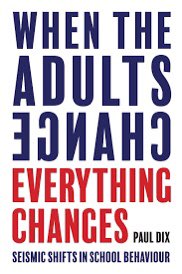Was I right?
- Andy Wykes
- May 18, 2022
- 4 min read
From reading both of Paul Dix’s books on behaviour, When the Adults Change Everything Changes and the sequel After the Adults Change - Achievable Behaviour Nirvana, I have thought again about some of my approaches to behaviour and reflected on times in my past when I have either followed some of the recommendations in his books or thought again how things might have been different if I had acted in a different way.
I have had children from a variety of different behavioural backgrounds and worked in some deprived areas so some of the stories of the children’s backgrounds resonated with me. My first school was in one of the governments ‘model towns’ left without any significant social spending from its inception to most recently.
My first class as an NQT had some children who appeared to show behavioural issues. We got on well and the child made good progress - the behavioral tendencies that were seen did not disappear but there was a reduction in outbursts and there was a lot of respect built over the year. A lot of this came out of naivety as I had no understanding of how to manage a classroom as this is not something that is taught or could be taught effectively at University due to how varied each school is. Due to having no strategies I handled the behaviour of the children in the only way that I knew how by being their friend. Whilst now I look back on this approach in a different way, it does resonate slightly with one of the messages from Paul Dix’s book. The children need someone on their side, they need to feel that they are not alone and that they are Respected. For this child, I was that.
One of the most humbling experiences for me was when in that very same year a new child was starting at the school. That child had never enjoyed school but something that I had done had some impact as this child now loved it. I, still to this day, have no idea what I had done and I can only hope that one day I find out.
Paul Dix talks about how consistency is key and I feel that, or at least I hope that, I have been consistent throughout my career in the way that I have treated the children in my care. Both in terms of behaviour management but also with the level of respect that they deserve. I can only think of one time, where now on reflection I conclude, that I let a child down by not being consistent. A particularly challenging child, who after a half-term became violent towards other children in the class as well as staff members including me. To this day my biggest regret is not being able to support that child further. In hindsight, after reading Paul Dix’s books, I can see that I was not consistent in my approach towards them I was not calm or helpful in terms of my mannerisms but this was not because I did not want to be but because I did not know how to be and had not received CPD or support on how to deal with these situations. After reading Paul Dix's books I can now say that I would definitely have treated this scenario very different. Although I can’t say definitively whether this would have changed the outcome, I can say that being more consistent and calmer throughout this experience would have been more positive for all.
Luckily, when approached with a similar situation more recently I had developed as a teacher and became more confident that I could handle this situation more effectively. A child in my care flourished with me - they developed into a more respectful, receptive and caring child. Not because they never were but because they were given a chance to. The year was not perfect, but due to my consistency in the approach to the child, my relationship was/is still positive to this day. The respect remains and that child knows they can depend on me. However, due to inconsistencies in approaches that child has had a difficult year. That is not their new teacher's fault alone, but also mine. When people go alone with their approach, it can cause issues and now after reading Paul Dix’s books, I can see that although I had a win due to the lack of consistency across the setting this was not translated into a permanent win.
The work that I am supporting on now where I work regarding behaviour will continue to allow for all children to have a consistent approach to behaviour, for all children to feel safe for all children to feel respected and for all children to flourish. So thank you to the Paul Dix for the journey that I have been on since first receiving a copy of your book - I hope to one day be a consistent practitioner.





Comments